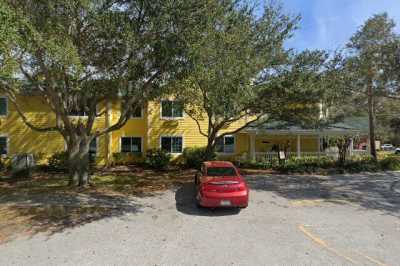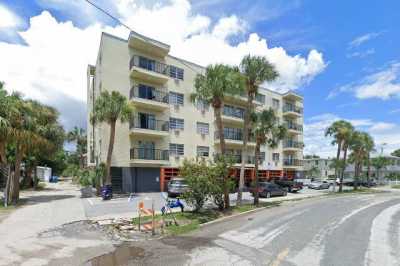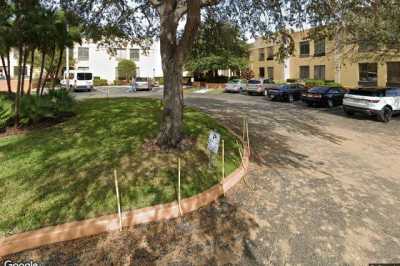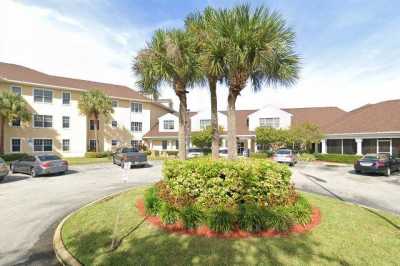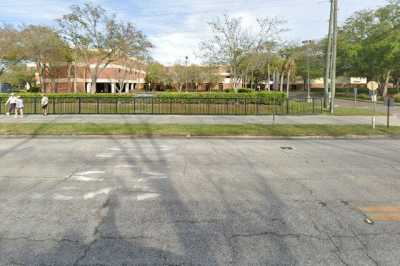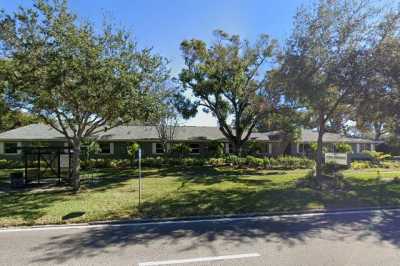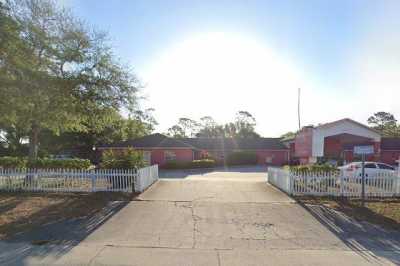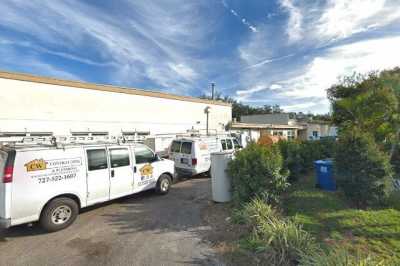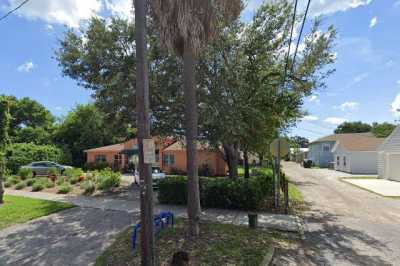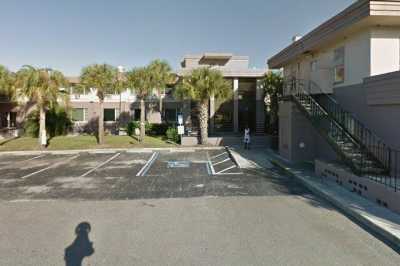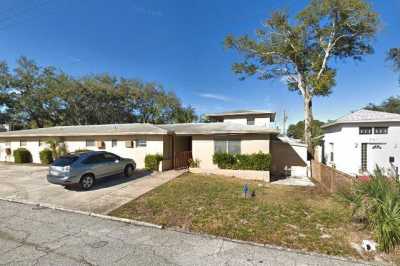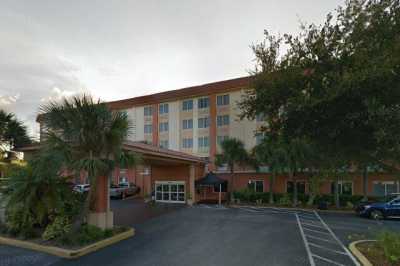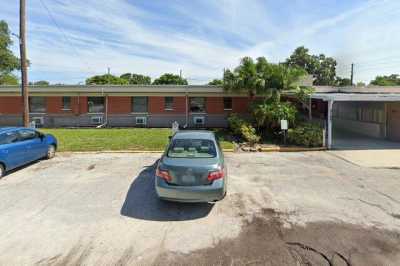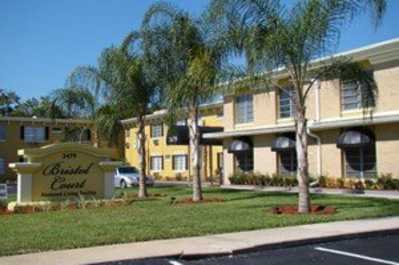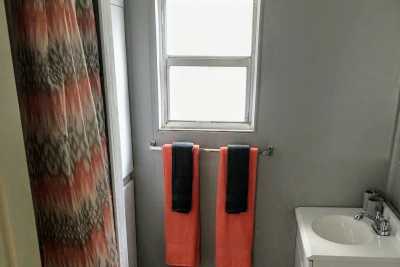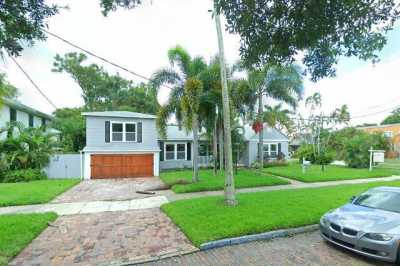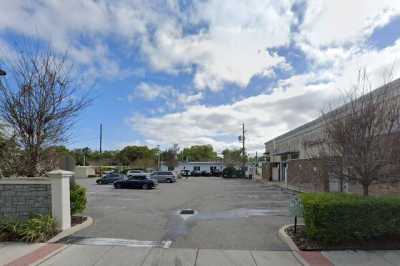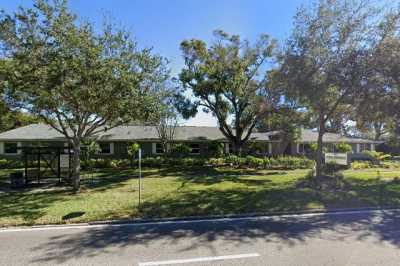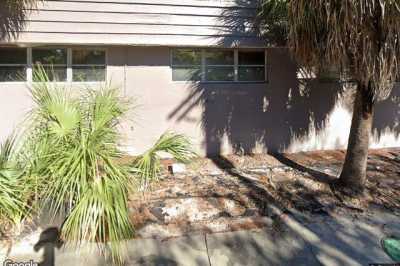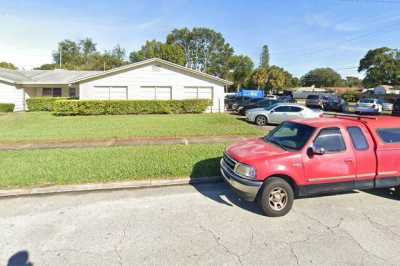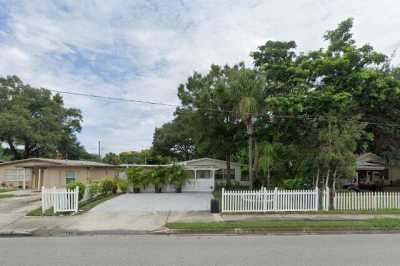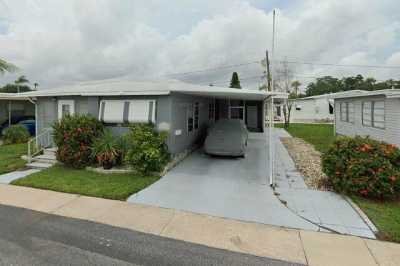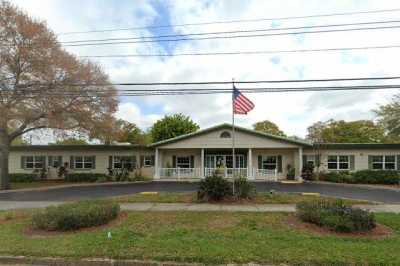
10 Best Nursing Homes in St Petersburg, FL
Florida has long been considered an ideal place to retire to, which is certainly true of St. Petersburg, a city nicknamed The Sunshine City. It’s also no surprise that St. Petersburg is a city that has plenty of options for people looking for nursing homes. For those who want to live in a warm climate surrounded by plenty to do — from nature to art — St. Petersburg is a great place to be.
Sometimes referred to as skilled nursing facilities, nursing homes provide some level of medical care for residents. It should be noted that people looking into nursing homes could be seeking different types of care. Assisted living facilities offer support for seniors who need help with daily activities but are still somewhat active in everyday life, while memory care offers 24/7 support for those who have Alzheimer’s disease, dementia, or other memory-related needs. Assisted living and memory care living facilities are often bundled within the category of nursing homes, but they offer different services.
For those looking to move to St. Petersburg, Florida, you’ll find plenty of options with A Place For Mom’s partner facilities. There are 32 assisted living and memory care facilities within 10 miles of downtown St. Petersburg, including communities like Sunset Beach and Pasadena. This guide will tell you everything you need to know about the process, from how much it costs to how to pay for those expenses, plus it will highlight activities in the St. Petersburg area.
Nursing Homes Facilities near St Petersburg, FL
My loved one is currently a resident at The Villas of Casa Celeste and everything has been very good for her at this facility so far. The sales lady, [name removed], is amazing. They have been wonderful to...
I googled the Vineyard Inn to send to another family. I saw you only put three stars, as a physical therapist and now daughter of somebody who is staying there I must stay it rates much higher!.. there are...
They have a game room, books to read, movies to watch, and special events that they do once or twice a week. Very friendly staff! She is allowed to have her dog there, so that is a plus. She is in...
We had our first meeting today with the head nurse and some of the staff, along with PT and the planning person. I had a lot of my questions answered. The building is older, but they keep it clean. The food...
I cannot say enough positive comments about this facility. Having a family member transition is always hard on both the one changing from independent assisted living to memory care assisted living. The staff...
Our free advisors can help
- Compare local facilities
- Determine care type
- Schedule tours
- Evaluate pricing
Our methodology
How we rank order the St Petersburg community options above
We developed a proprietary recommendation system that orders St Petersburg community options based on factors we know are important to seniors and their families:
- Proximity to your search location
- Availability of recent, high-quality reviews
- The amount of detailed community information available
Where we source our information
14,000+ communities
We collect proprietary data from our network of 14,000+ senior living communities in the U.S., with regular refreshes of data and information
350,000+ reviews
We have 387,000+ reviews from senior living residents and family members that provide first-hand accounts about senior living communities
- Costs of nursing homes in the St. Petersburg area
- What families are saying about nursing homes in St Petersburg
- How people pay for a nursing home in St. Petersburg
- Understand Florida laws and regulations for nursing homes
- What to expect from nursing homes in St. Petersburg
- St Petersburg nursing homes services and amenities
- Explore senior care with confidence
- Unfamiliar with St. Petersburg? Highlights for seniors
- Health care for seniors in St. Petersburg
- Transportation for seniors in St. Petersburg
- Senior activities in St. Petersburg
Costs of nursing homes in the St. Petersburg area
The average cost of a private room in a nursing home facility in St. Petersburg is $9,885.[02] According to A Place for Mom’s proprietary data, the average costs in St. Petersburg are $3,930 for assisted living and $4,038 for memory care; these figures include any additional fees paid by seniors.[01]
The cost of an assisted living facility or memory care unit will depend on a variety of factors, but the figures above include amenities and features like wheelchair accessibility, holistic care, common areas for socialization, and chef-prepared meals.
Average monthly cost of Nursing Homes in St Petersburg, FL vs. nearby cities
Average monthly cost of Nursing Homes in St Petersburg, FL vs. the state and national average
Average monthly cost of Nursing Homes in St Petersburg vs. other types of senior living
Median monthly costs of Nursing Homes in St Petersburg, FL by room type
Average cost of Nursing Homes in St Petersburg over time
What families are saying about nursing homes in St Petersburg
Recent reviews for nursing homes in St Petersburg
Westminster Palms in Saint Petersburg, FL
The Villas Of Casa Celeste in Seminole, FL
Sun Towers in Sun City Center, FL
How people pay for a nursing home in St. Petersburg
There are several ways for people to pay for nursing homes, assisted living, and memory care in St. Petersburg, Florida. Here you will find everything you need to know about how to cover the cost of senior living through private pay, U.S. Department of Veterans Affairs benefits, Medicaid, or Medicare.
Paying for assisted living or memory care with private pay means that you are paying with the money that you or a family member have accumulated over the course of a lifetime. This money could come from savings, retirement funds, pensions, or investments.
Any one of the above or any combination of the options above can help you cover the cost of assisted living or memory care. You can also use any of the options listed below:
Number of veterans who live in St. Petersburg
About 22% of St. Petersburg veterans are 75+
Veterans in or looking to move to St. Petersburg, Florida, can find benefits that can help offset the cost of assisted living or memory care facilities. VA Pensions are useful in covering some of the costs of senior living, as is the VA Aid and Attendance benefit. Aid and Attendance benefits are earmarked for veterans who need assistance on a daily basis with activities such as bathing, dressing, or eating or have other issues.
Though a wonderful benefit, A&A is known for its complex application process. Fortunately, resources in St. Petersburg can help seniors, starting with Pinellas County’s guide to help veterans determine how to access benefits. Veterans services officers are another resource to help veterans with the application process; these officers have navigated this process many times and know how to check for eligibility, fill out the application, and connect veterans to benefits.
Veterans services officers can be found through Veterans Services Organizations (VSOs). Several VSOs are located centrally at the St. Petersburg Regional VA Office, including AMVETS, Veterans of Foreign Wars, Disabled American Veterans (DAV), Paralyzed Veterans of America, and Vietnam Veterans of America.
Those who were disabled as a result of their service can apply for VA Disability Compensation. The resources listed above can help with this process as well.
Additional resources
St. Petersburg Regional VA Office
9500 Bay Pines Blvd.
St. Petersburg, FL 33744
Phone: 800-827-1000
Hours: Monday through Friday, 8:30 a.m. – 4 p.m.
Veterans of Foreign Wars
Post 39
2599 Central Ave. N
St. Petersburg, FL 33713
Phone: 727-327-8109
Email: vfwpost39+ContactUs@gmail.com
Post 4364
5773 62nd St. N
St. Petersburg, FL 33709-1735
Phone: 727-546-5525
Medicaid in Florida is called State Medicaid Management Care (SMMC), and Florida offers a Medicaid guide to help seniors understand both the benefits and the eligibility requirements. While Medicaid does not cover the cost of living in an assisted living or memory care facility, Florida nursing home residents can receive in-home care through the Home and Community-Based Services (HCBS) waiver system.
Florida’s Statewide Medicaid Managed Long-Term Care Managed Care (LTCMC) plans cover the costs of nursing care, chore services, and medical equipment and supplies for those who qualify. Within the LTCMC plans are two programs: the Long-Term Care (LTC) Managed Care Program and the Managed Medical Assistance (MMA) Program. To qualify, seniors living in assisted living or memory care facilities need to meet two standards: financial eligibility and being in need of a nursing home-level of care.[03]
It is important to note that each LTCMC plan contracts with its own providers, meaning not all facilities are covered under every plan. It is crucial that seniors choose the plan that covers the facility they want to enter.
For those seeking memory care, Florida offers support services through its Alzheimer’s Disease Initiative (ADI) within the HCBS waiver system. ADI respite care is available for caregivers of adults who have been diagnosed with Alzheimer’s disease or related memory disorders that may interfere with daily living activities.
Florida’s State Health Insurance Program (SHIP), a Medicare program run by local Medicaid, is called Serving Health Insurance Needs of Elders (SHINE); it offers counseling to seniors who need help connecting to resources. The local Area Agency on Aging and long-term care ombudsman can also help seniors get connected with helpful benefits.
Those in Florida looking to apply to SMMC can do so online or by calling 866-762-2237. The application process can be complex to navigate, so seniors in Florida are recommended to use the resources available to make the process easier.
St. Petersburg resident Medicaid resources
Medicaid Office – St. Petersburg
525 Mirror Lake Drive N, Suite 510
St. Petersburg, FL 33701
Phone: 727-552-1900 or 800-299-4844
Fax: 727-552-1216
Hours: Monday through Friday, 8 a.m. – 5 p.m.
The Local Area Agency on Aging
9549 Koger Blvd. N
St. Petersburg, FL 33702
Phone: 727-570-9696
Helpline: 800-963-5337
Out-of-area callers: 727-217-8111
Hours: Monday through Friday, 8 a.m. – 5 p.m.
Florida Ombudsman Program
4040 Esplanade Way, Suite 270
Tallahassee, FL 32399
Toll-Free: 800-963-5337
TTD/TTY: 800-955-8770
Email: information@elderaffairs.org
SHINE (Serving Health Insurance Needs of Elders)
4040 Esplanade Way, Suite 270
Tallahassee, FL 32399-7000
Toll-Free: 800-96-ELDER (800-963-5337)
TTD/TTY: 800-955-8770
Fax: 850-414-2150
Email: information@elderaffairs.org
Medicare is a federally run long-term health insurance program that can help offset some of the costs associated with seniors’ needs for people 65 and over. While it can help cover the costs of things like doctor’s visits, prescription medications, therapy, and dietary counseling, Medicare will not cover the cost of living for assisted living or memory care facilities.
Florida Medicare Savings Programs can help eligible seniors cover expenses like Medicare copays and deductibles, while the Drug Assistance Program can help with medication costs. The Program of All-Inclusive Care for the Elderly (PACE) helps seniors who need nursing home-level care receive that care where they currently live.
Applications for Medicare can be completed through the Florida ACCESS system or through the local Department of Children and Families Center. The application can be complicated, so seniors are highly encouraged to use local resources to help with the process. The local ombudsman knows the process well, can answer questions, and help determine whether you or your loved one is eligible.
Applicants can also use the Serving Health Insurance Needs of Elders (SHINE) program for free counseling on the application process; SHINE is run through Florida’s Medicaid program. Florida seniors can also seek aid through the local Social Security office or the local Area Agency on Aging.
St. Petersburg resident Medicare resources
Florida Department of Children and Families
2415 N. Monroe St., Suite 400
Tallahassee, FL 32303
Phone: 850-487-1111
Customer call center phone: 850-300-4323
Hours: Monday through Friday, 7 a.m. – 6 p.m.
Area Agency On Aging of Pasco-Pinellas
9549 Koger Blvd.
Saint Petersburg, FL 33702
Helpline: 800-963-5337
Office phone: 727-570-9696
Email: info@aaapp.org
Hours: Monday through Friday, 8:30 a.m. – 5 p.m.
SHINE
4040 Esplanade Way, Suite 270
Tallahassee, FL 32399
Phone: 800-963-5337
Email: information@elderaffairs.org
St. Petersburg Social Security Office
30 Dr. MLK St. S
St. Petersburg, FL 33701
Phone: 800-772-1213
Hours: Monday through Friday, 9 a.m. – 4 p.m.
Prescription Health Program
5501 Fourth St. N
St. Petersburg, FL 33701
Phone: 727-327-0333
Suncoast PACE (Pinellas County)
6774 102nd Ave.
North Pinellas Park, FL 33782
Phone: 727-289-0062
Hours: Monday through Friday, 7:30 a.m. – 4:30 p.m.
Florida’s Long-Term Care Ombudsman Program
4040 Esplanade Way, Suite 380
Tallahassee, FL 32399
Phone: 850-414-2323
Email: LTCOPInformer@elderaffairs.org
Florida Medicare Savings Program
North Pinellas Service Center (Pinellas County)
11351 Ulmerton Road, Suite 130
Largo, FL 33778
Phone: 866-762-2237
Hours: Monday through Friday, 8 a.m. – 5 p.m.
Understand Florida laws and regulations for nursing homes
All skilled nursing homes, assisted living facilities, and memory care facilities are required to be licensed in Florida. This is done a little differently depending on the definition of care service.
Nursing homes in Florida are licensed by the Florida Agency for Health Care Administration (AHCA). Because they are required to be licensed, they undergo regular inspections. For nursing homes, inspections in Florida happen every one to three years, though they are typically conducted once a year unannounced. These inspections are completed to make sure that Florida nursing homes are following state and federal guidelines.[04] If a nursing home does not meet standards set by the state and federal government, they are required to submit a Plan of Correction.[04] Anyone interested can view inspection reports through AHCA’s Public Records Search.
Nursing homes must do several things to keep their license. Every nursing home in Florida must have at least one dietician, nurse, and physician on the grounds at all times. All nursing homes must provide a safe, clean, comfortable, and homelike environment. Nursing homes must also be set up for individuals with physical ailments, meaning that they are required to have ramps, safety rails, and other precautions to prevent falls and accidents. Medical staff at nursing homes are required to meet ongoing education requirements.
Florida nursing home staffing requirements revolve around three levels of care providers: certified nursing assistants (CNAs), licensed practical nurses (LPNs), and registered nurses (RNs). It is required that there are enough CNAs, LPNs, and RNs to provide 3.6 hours of direct care per patient per week.[04]
Assisted living rules and regulations
Assisted living facilities in Florida are considered a vital part of long-term care; they are required to be licensed by the Bureau of Health Facility Regulation, and relicensing occurs every two years.[05] Beyond standard licensure, specialty licenses such as limited nursing services, extended congregate care, and limited mental health services can be acquired by facilities offering specialized care plans.
To become licensed, assisted living facilities must meet standards when it comes to staffing and staff training; for example, the regulations require minimum staff hours per week for different numbers of residents to ensure adequate coverage for residents’ needs. Inspections occur at the time of licensing, as well as any time the licensing agency deems an inspection necessary. Inspections assess food safety, physical safety, and biomedical waste; interested parties can find inspections via the Agency for Health Care Administration’s public records.
Assisted living facilities are required to have at least one staff member with certification in First Aid and cardiopulmonary resuscitation be on the premises 24 hours a day.[05] The kitchen staff is required to provide meals that meet the nutritional needs of residents, including therapeutic diets ordered by medical providers.
Residents also must meet eligibility restrictions. Those who wish to live in assisted living cannot need 24-hour assistance, need to be able to perform many of the activities of daily living, and should be able to participate in social or leisure activities. New residents in all Florida assisted living facilities are examined by a licensed nurse within 60 days of moving in and are then examined monthly thereafter.[05]
Memory care facilities rules and regulations
Memory care facilities are similarly inspected, but they meet slightly different requirements. For example, memory care facilities are required to have one person on staff at all times who is trained specifically for dementia care.[06] The Bureau of Healthy Facility Regulation licenses all memory care living facilities in Florida; all memory care facilities are inspected upon licensing, with licensing needing to be renewed every two years. Inspections cover food safety, physical safety, staffing requirements, and emergency procedures.
Residents also have to meet certain requirements; to be admitted to a memory care facility, one must have a medical evaluation no more than 60 days prior to moving in, or no more than 30 days after moving in. This evaluation helps determine a personalized care plan for each resident in memory care.[06]
Florida Department of Health contact information
Florida Department of Health
4052 Bald Cypress Way
Tallahassee, FL 32399
Phone: 850-245-4444
Hours: Monday through Friday, 8 a.m. – 5 p.m.
COVID-19 regulations for St. Petersburg nursing homes
No COVID-19 mandates for assisted living or memory care facilities exist in St. Petersburg. The city primarily recommends following the Centers for Disease Control guidelines.

Vaccinations.
Vaccinations are recommended for seniors in memory care.

Masking.
If feeling ill, masks are recommended while indoors.

Facility cleanliness.
Regular cleaning of surfaces is highly encouraged because it can help mitigate the spread of COVID-19.
What to expect from nursing homes in St. Petersburg
Moving into skilled nursing care, assisted living, or memory care living is not an easy decision. Not only do you have to find a place that can offer the proper level of care for you or your loved one, but you also want to find a place that offers the desired lifestyle. Fortunately, St. Petersburg, Florida, has plenty of options.
A variety of care options for different needs
A Place For Mom does not partner with nursing homes, but it does have 32 partner assisted living or memory care facilities within a 10-mile radius of downtown St. Petersburg. Four of these are standalone assisted living facilities, while one is a standalone memory care facility. Five offer a combination of assisted living and independent living, while six go one step further and add memory care into the mix, offering a progressive type of care that’s appealing to careseekers as it covers many life stages. Three offer a mix of assisted living, adult day care, and memory care, and 11 are considered assisted living/memory care.
For those interested in group homes, St. Petersburg offers one standalone group home, as well as one facility that’s a combination of a group home and a memory care complex. There’s truly a right setting for all residents of St. Petersburg.
Amenities and activities that embrace seniors’ stage of life
The goal of assisted living or memory care living is to make life as fulfilling as possible for residents while they are under a facility’s roof. Because of that, assisted living facilities and memory care facilities offer a whole host of activities and amenities. There are organized outings and group activities and, depending on the facility, you’ll find a bar, a dining area, a theater, game rooms, TV lounges, barber shops, and more. More than three-quarters of A Place for Mom’s partner facilities offer activity directors, art classes, live music, picnics or BBQs, and holiday parties.
Health care to keep daily needs manageable
Health care differs from place to place and type of facility — whether it is an assisted living facility or a memory care facility — but you should expect to find some combination of medication management, 24/7 staff, on-call physicians, and on-site nursing. A full 84% of A Place for Mom partner facilities offer some aspect of memory care, and many offer specialized memory care training. Furthermore, health care can often be received on-site, with visiting nurses, podiatrists, occupational therapists, physical therapists, and speech therapists available at the vast majority of these partner facilities.
St Petersburg nursing homes services and amenities
Availability of select care services in St Petersburg nursing homes
Availability of select dementia care services in St Petersburg nursing homes
Availability of select dietary accommodations in St Petersburg nursing homes
Availability of select dining options in St Petersburg nursing homes
Availability of select programs and activities in St Petersburg nursing homes
Explore senior care with confidence
Know where to start.
Identify the right care for your loved one with our free assessment.

See what you can afford.
Understand cost and payment for long-term care based on your loved one's needs.

Find top facilities for you.
Free, personalized guidance from our Senior Living Advisors can help you narrow your search.

Tour your favorite facilities.
Our free touring checklist can help you choose the right community.
Unfamiliar with St. Petersburg? Highlights for seniors
Number of seniors over the age of 65 currently living in St. Petersburg
Median annual income for St. Petersburg seniors 65 and older
Health care for seniors in St. Petersburg

St. Anthony’s, established in 1931, is considered a premier choice where technology meets compassion.

Bayfront Health St. Petersburg
Throughout its 100-year-plus history, Bayfront Health has been providing care to St. Petersburg area residents. It’s also been awarded the designation of one of America’s 100 best hospitals for spinal surgery, according to U.S. News & World Report.

HCA Florida Northside Hospital
HCA Florida Northside Hospital is part of Florida’s largest health care network and is well-known for its comprehensive stroke center.
Transportation for seniors in St. Petersburg
St. Petersburg is a city where some form of transportation is necessary for everyday errands like grocery shopping or doctor’s appointments. With that in mind, 88% of A Place For Mom’s partner assisted living or memory care facilities offer complimentary transportation for their residents.[01] Approximately half of A Place For Mom’s partner assisted living or memory care facilities offer at-cost transportation services as well.
For those in need of public transportation, the Pinellas Suncoast Transit Authority (PTSA) offers a discount for anyone over the age of 65; this also makes it a strong option for memory care residents traveling with caretakers. The PTSA also offers the Disabled Special Citizen Program, which offers discounts for anyone who has applied for and been accepted to the program.
Senior activities in St. Petersburg
Known as The Sunshine City, you won’t be surprised to hear that St. Petersburg, Florida, is a great place to get outside. Not only that, but there is plenty of culture to be found as well.
For those wanting to enjoy the outdoors, a relaxing day on the water could be just the ticket. Catch the sunset and then stay for the light show at the Skyway Bridge; cruises are available for those who prefer the waterway, and dolphin sightings are common here. If you love animals, Florida is a boon for bird-watching, and it is especially good at Sawgrass Lake Park. If you time it just right, you can see thousands of birds making their plans for migration.
We can’t mention outdoor attractions in Florida without including the flora and the fauna! The Sunken Gardens started as a hobby in 1903 by George Turner; now, it is a special place where you can see rare plants as you take a quiet and relaxing stroll.
St. Petersburg also has plenty for the art lovers out there! Salvador Dalí fans will want to check out the Dalí Museum; its art spans his entire career, and it offers some accommodations for those with vision or hearing impairments. Those impressed by glasswork will be more than impressed with the Duncan McClellan Gallery. Even better is that it is free of charge! Sometimes, though, you want to get your hands dirty. Learn how to make your new favorite coffee mug (or any other type of pottery) at Charlie Parker Pottery. To take in some contemporary work, also free of charge, visit the Morean Art Center.
Often thought of as a key spot for retirement, St. Petersburg, Florida, has a great network of services for seniors looking to move on to the next phase of life. Seniors will be able to find the care they need while enjoying beautiful Florida weather and beaches.
Frequently Asked Questions
Inspired Living at Tampa, Coral Oaks and Weinberg Village are the top-rated Nursing Homes facilities near St Petersburg, FL. These Nursing Homes facilities received the highest rankings based on verified family reviews. See full list of communities.
The average cost of Nursing Homes in St Petersburg is $4,058 per month. This cost may vary based on location, amenities, floorplan, level of care and other factors.
References
A Place for Mom. (2023). A Place for Mom proprietary data.
Genworth. (2023). Cost of Care Survey. Genworth.com.
State of Florida | Department of Elder Affairs. (March 2023). Statewide Medicaid Managed Care Long-Term Care Program. Elderaffairs.org.
State of Florida | Health and Human Services. (March 2023). Compendium of Residential Care and Assisted Living Regulations and Policy (2015). Hhs.gov.
Florida Agency for Health Care Administration. (2023). Assisted Living Facility.
State of Florida | Statutes & Constitution. (March 2023). 2022 Florida Statutes (including 2022 Special Session A and 2023 Special Session B). Leg.state.fl.us.
U.S. News & World Report. (2022). Bayfront Health St. Petersburg.

More questions?
Ask an A Place for Mom local advisor at no cost.
- Pinellas Park, Florida
- Feather Sound, Florida
- Cross Bayou, Florida
- West Lealman, Florida
- Kenneth City, Florida
- Bay Pines, Florida
- South Highpoint, Florida
- Lealman, Florida
- Bardmoor, Florida
- Madeira Beach, Florida
- The Jungle, Florida
- Largo, Florida
- Ulmerton, Florida
- Mitchell Beach, Florida
- Treasure Island, Florida
- Gandy, Florida
- Walsingham, Florida
- Coachman, Florida
- Seminole, Florida
- South Pasadena, Florida

